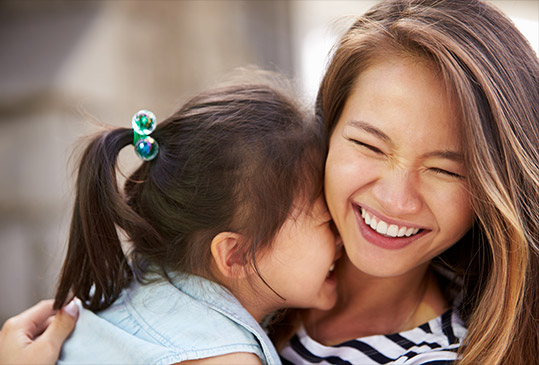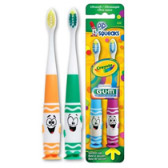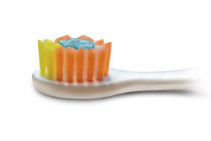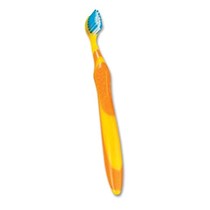Oral Care for Children
My Child Won’t Clean His/Her Teeth
Children’s interest and attention to personal hygiene vary, and interest in their mouth and its cleanliness is no different. Toddlers can simply be uncooperative and not allow you to easily access their mouth with a toothbrush. Older children may just not think it is very cool, have other priorities, or choose daily oral hygiene as an issue to make a statement to their parents or caregivers.

Tips for toddlers:
Like with so many issues with this age group, there is no easy or single solution. As your toddler gets more and more teeth and starts to eat a wider variety of foods, regular brushing becomes increasingly important. Here are some tips for toddlers:
- Use mild-flavored kids toothpaste. Most regular kinds of toothpaste have very strong flavors which children may find too strong and unpleasant. Only a smear of toothpaste should be used. If you think toothpaste may be part of the problem, try milder flavors or even brushing without it. However, be aware that the fluoride in toothpaste strengthens tooth enamel and builds protection against tooth decay, though brushing without toothpaste is still better than not brushing at all. Ask a dentist about other forms of fluoride protection.
- Use only a small brush appropriate for your child. Check the packaging for age-range before you purchase a toothbrush for your child. Kid’s toothbrushes are available in many different colors and feature many popular fictional characters to make brushing fun and motivating.

- Toddlers love to copy many things their parents do, so try to make one of those things toothbrushing! Sit on the bathroom floor or another suitable place, like in front of a mirror, so that your child can see what you do with your brush and can try to mimic it. Once the child is willing to place the brush in his/her mouth, move on to the next stage: allow him/her to hold your brush, and “brush” your teeth. This may help familiarize the child with the process and eventually permit you to do the same for the child. However, do not share toothbrushes, as decay-causing bacteria can be transferred from your mouth into the toddler’s and increase his/her risk for dental decay. Bath-time is also a good opportunity to attempt toothbrushing along with all the other toys, etc. in the bath.

- Figure: For children under age 2 years, apply no more than a smear of fluoride toothpaste
Tips for Older Children
Not brushing teeth is in the same category as not doing homework, not keeping a tidy bedroom, not taking a shower, and not taking out the trash. Children are naturally biased towards enjoyment and fun activities. Logic and reason are unlikely to be persuasive as all the consequences of dental disease are so far in the future to them. If the consequences are not in the next few hours, they don’t matter to most children. Encouraging healthy behaviors can be challenging, but it is a part of parenting. Always be a good role model yourself and emphasize the positive benefits rather than issue threats that are negative and seldom come true. The positive benefits can include: good looks of whiter teeth, fresh breath and no nasty odors when in close contact with others, a mouth that feels fresh and clean, and happy dental check-ups. Negative comments would include: rotten teeth, teeth falling out, pain, inability to enjoy food, and teasing by others. Here are some tips for older children:
- Involve older children in the selection of their toothbrush. There are many different brushes for all stages of childhood with all sorts of added features from favorite characters to “laser” lights and music. Just make sure that the brush is designed for the child’s age range so that it will fit well in the mouth and reach all areas.

- Allow them some choice in the selection of their toothpaste. Toothpastes come in many different flavor and color variants, but not everyone likes every flavor or color, and some brands may be “more cool” than others. However, do not forget that children 2-5 years of age should only use a pea-sized amount of toothpaste; for children over six years of age, a normal brushful can be used. Children should spit out and not swallow the excess toothpaste after brushing.
- Brushing before meals is good! If the child wants to enjoy the meal, he/she needs to perform personal hygiene measures including tooth brushing beforehand. Brushing before a meal in any case is good for oral health. Removing the dental plaque before consuming any sugars means there are less bacteria in the mouth to convert the sugar into acid and cause dental decay. Also the fluoride in toothpaste hardens and strengthens the tooth enamel making it more resistant to the acids in some foods and beverages, like orange juice or carbonated drinks. Clean teeth before breakfast should be non-negotiable.
Here's what to do for good oral Health
For all children, good mouth care should include the following:
- Twice daily brushing with an age-appropriate toothbrush for every family member – no sharing. Bristles should be soft. Choose a favorite character or color to help identify which brush belongs to whom. Brushing should be supervised and supported until the child has enough manual dexterity to clean all surfaces of all teeth alone.
- Use fluoride toothpaste: for infants and toddlers use only a light smear of paste, for children two to five years old, a pea-sized amount, and six years old and over, a regular adult amount.

- Between teeth cleaning should start early – once a child’s teeth fit closely alongside one another. Use either interdental brushes, flossers specially designed for children, or dental floss.
- Cheese is one of the healthiest snacks for your child’s teeth – providing much needed calcium and stimulating the salivary glands, which cleans the mouth of food debris and protects against acids.
- Limit the consumption of acidic beverages (fruit juices and sodas) to be only part of a meal.
- Regular dental visits for monitoring the health of teeth and gums and the growth of the jaws and face should start when the child is 12-months old.
- For older children playing sports and engaging in hazardous activities, consider mouthguards to prevent injuries to their teeth and mouth.


